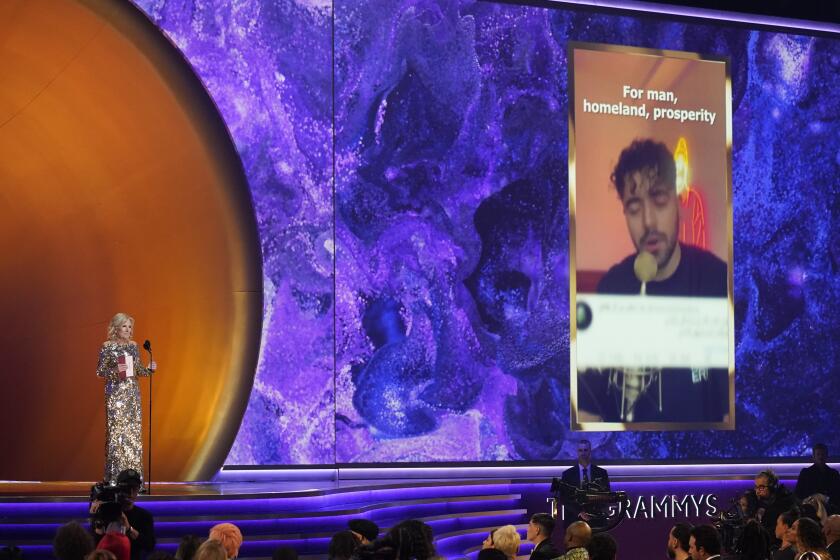Commanding Respect
As a responsible reporter, I should write of India--the world’s top-selling female salsa singer--in the third person, to keep my feelings out of the story.
I should tell you dispassionately that after a Bronx childhood of poverty and domestic violence, after a 15-year career gaining legions of fans through constant touring, India is finally where many think she should have been years ago: on the verge of superstardom.
I should tell you India’s lawyers are negotiating a spectacular new record deal for her, that Sony Music--not India’s current label, RMM--sent her flowers for her Grammy nomination last month. I should tell you she’s lost 45 pounds, fits into a size 8 again, feels great and is entering a new phase of her life.
“Girl, alls I can say’s it’s about [expletive] time!” she squealed after a recent Conga Room appearance. She laughed, just as she has every time I’ve seen her, throwing her head back dramatically. Speaking in a gruff Nuyorican accent that seems impossible given her high, trumpet-like singing voice, she flashed a perfectly manicured hand, snap snap, and said that she’s never been happier.
I shouldn’t talk about how much I admire India, real name Linda Caballero, real age negotiable (either 27 or 31, depending on what year you asked). But I can’t help it. India is my hero.
See, India is a voice for all of us women born and raised in the U.S. with parents from traditional societies. She knows what it’s like to hear older women say the best remedy for your man’s cheating is to fight harder to keep him happy. She knows what it’s like to have men accuse you of “wearing the pants,” as if this were an insult. She knows what it’s like to have grown up watching the feminist movement of the 1970s unfold on TV, while at home women tiptoed around men and suffered quietly because they thought this was their God-given lot in life.
And, like me and many of my friends, India railed against the suffocating traditional norms, and took her message of freedom to the streets, with all the flak that entailed. She’s a great singer, yes, but in communities where literacy still remains too low, and where many people get their rules for living from popular music, she is also a leader.
Let me show you what I’m talking about.
The first time I saw India sing live was at a dumpy nightclub near Boston, in 1995. Dressed in a flowing black shawl and cuffed pants, cigar smoldering between her strong fingers, she sat on a high stool on the stage and searched the room with dark, ferocious eyes, looking for controlling men. She found plenty, swaggering around. And she sang, in Spanish, fearlessly, right to them.
That man who you see over there, the one who seems so nice . . . I know him as well as I know myself . . . He’s a big stubborn fool, an idiot, untrustworthy, egotistical and capricious, spiteful, presumptuous, he has no heart.
The dancing couples slowed their steps, then separated. The women stood up straighter. The men slouched. Then the women sang along. Some high-fived each other. I had never seen that happen at a salsa show. I saw it again when she played a ballroom two years later.
Now, maybe this doesn’t impress you. Maybe your granny was a suffragette. But for most of the women India sings to, female empowerment is somewhat new. And hearing it in salsa lyrics is very new. There are only two female superstars in salsa: India and her godmother, Celia Cruz.
Market research indicates that most modern salsa fans are young females of Caribbean Latino descent, on the East Coast, Florida and Puerto Rico. So few women have succeeded in salsa because many record executives have tried to appeal to this demographic with stereotypical, scantily clad vocalists who sing about heartache; when these acts failed, the labels decided women can’t sell salsa, rather than rethinking their approach to marketing.
India, on the other hand, fought hard to keep her lyrics and image genuine to her experience. It wasn’t always easy, she says. But it paid off. According to Bill Marin, former vice president for RMM, the label tried to get India to be more traditional, and she refused. Once, when Marin suggested India lose weight, he says, she poked her finger in his chest and told him he had a lot of nerve.
“She stuck to her guns,” says Marin, “and in the end we all realized she was pretty much right on the money lyrically and musically. . . . She touched the hearts of the female buying public, which [dominates] sales in tropical music.”
While this may have surprised male record executives, it doesn’t surprise people familiar with traditional cultures and their effects on women.
“Her lyrics allude to the fact that, yes, we are very traditional, but that certain traditions can destroy us as human beings,” says Jeanette Beltran, national director of special programs for the Latina Health Network in Washington. “Before India, no one talked about it openly. She’s reached places no one reached before with this message.”
“She’s sort of reclaimed feminism in a really sexy way,” says Christy Haubegger, publisher of Latina magazine. “In the same way an Alanis [Morissette] resonates, India resonates. In another time she would have been a blues singer, the way a Billie Holiday could tear your heart out while making you swoon. That’s what she does.”
India knows she’s a leader but says it’s not always easy.
“Do you know how many enemies I have, girl?” she says with a laugh. “They’re mainly all men, my enemies. They can’t stand me. I say, ‘Why do you hate me so much?’ Cuz I got something to say? It’s not about you. It’s about those men, you know, careless, rude, heartless, abusive men who beat their women and take advantage of them. That’s what it’s about. Child abuse. Domestic violence. It’s more than you just being a cheat.
“I’m a feminist. It’s about survival. It’s about working hard and giving your heart and soul, and being professional. And if that makes you obnoxious, arrogant, if that makes you a snob or a bitch--and that’s what they call me--well, then let me be a bitch, then.”
India’s feminist baptism came as she hid under her bed as a child in the Bronx, listening to her father beat her mother.
“I remember wondering, my God, is he going to kill her?” she says. “I was terrified. I think about how many children went through the same thing I went through. They need role models. That’s what my music is all about. People think I’m against men, but I’m not bitter against men. I’m against domestic violence.”
When India was 7, her father left the family. India’s mother had little preparation for taking care of herself and her family.
“My mom had a lot of trouble sometimes holding steady jobs and sometimes she would get laid off and we had no way of paying the rent,” India says. “We would get actively evicted out of the apartment, go and stay with family. It’s just not the same as having your own bed. We lived like that for a lot of years.
“I felt like I needed to do something to get us out of there. Something had to happen. My mom, I used to shock her all the time. She said, ‘We haven’t got a pot to piss in, and this girl is telling me, “Mom, everything is going to be OK, we’re going to have some food. I don’t know when, but we’ll have something someday.” ’ It was hard times, and I think it happened for a reason.”
That reason, she says, was music.
India began singing professionally at 13 (or 17) to help pay the bills. “I tried school, that didn’t work. I tried modeling, I didn’t like that. Singing was the only thing in my life that when I did it everything fell into place.”
India sang at block parties, and recorded demo tapes with a childhood friend named Little Louie Vega, who became one of New York’s premier DJs during the late ‘80s house music movement. House is a feel-good descendant of disco and a predecessor of electronica that spawned a cultural scene that included Madonna, among others. Together, Vega and India landed a deal for India with producer John “Jellybean” Benitez’s label.
India recorded several dance music singles, including “Love and Happiness,” which made No. 1 on Billboard’s dance charts. India also began singing with a group called T.K.A. She married Vega during this time, as a teen, and they divorced four years later but remain good friends, she says.
At 17, India came to the attention of David Maldonado, then manager of salsa singer Ruben Blades.
Salsa had been invented by Puerto Ricans in New York about 20 years earlier, and now, Maldonado noted, young New York-born Puerto Ricans were flocking to house singers such as India and Marc Anthony. Why not start a new label that mixed salsa with an R&B; feel, he thought, in an effort to reach a broad Puerto Rican audience?
“So we started Soho Records,” Maldonado says. “It was affiliated with RMM, and our first two artists were Marc Anthony and India.” Both were soon the top-selling salsa artists in the world. They still are.
Maldonado teamed India with jazz pianist and salsa pioneer Eddie Palmieri for her first album, “Llego La India (India Has Arrived),” released in 1992.
The album, which SoundScan reports sold only 20,000 copies, established India as a serious vocalist with jazz and salsa fans, and salsa’s second female superstar was born. (The Recording Industry Assn. of America says many salsa album sales go unreported to SoundScan because the venues selling the music do not report to the monitoring service.)
Making money mostly from live performances, India was able to lease a $2-million penthouse on 12th Street in New York, she says, and her hard times were over.
India’s gorgeous second album, “Dicen Que Soy (They Say I Am),” was released in 1994. Produced by Sergio George, it featured a duet with Anthony. The album sold 144,000 copies, according to SoundScan, and defined the New York salsa sound of the 1990s. RMM estimates real sales were closer to half a million.
In 1996, India released a joint album with timbale legend Tito Puente called “Jazzin’,” which featured the Count Basie Orchestra. The album bombed commercially, selling only 30,000 copies. RMM responded quickly by releasing a collection of remixes of India’s top salsa songs the same year. That year she was also featured on two other albums: “Nuyorican Soul” by the band of the same name, and the compilation “Voces Unidas (Voices United).”
In 1997 India came out with her third solo salsa album, “Sobre el Fuego (Through the Fire),” which featured a hit single called “Mi Mayor Venganza (My Greatest Revenge).”
The song addressed the cultural norm of fighting to keep your man when he cheats on you. Rather than fight the other woman, India sang, the best revenge would be to let the other woman keep the jerk. It became an anthem in salsa circles, and the album sold 145,000 copies, according to SoundScan.
*
Last year, India released her fourth solo salsa album, “Sola (Alone),” which has so far sold 65,000 copies, according to SoundScan. “Sola” was nominated for a Grammy and showcased a slightly softer edge than India’s previous albums, which she credits to her growth as a person.
She’ll record one more album for RMM--probably a tribute to gutsy torch singer La Lupe--before moving to Sony. Friends and former colleagues say they hope her new label will not try to create an image for her, or try to change her. “I just hope they put her with producers who understand what India is all about,” says comedian and actor Sinbad, a close friend of India. “She’s got something so special, I’d hate to see them kill it.”
India says she won’t let anyone try to control her music, and she adds that she’s happy in love, has forgiven and befriended her father, and feels at peace with the world. She is in a relationship with Luis Quintero, the timbale and percussion player for her band.
“That’s the biggest mistake people make about me,” she says. “Thinking that I’m miserable or that I hate men. People will just say, ‘Oh, India must get burned with love.’ But you know what, ladies and gentlemen? I have a surprise. I’ve been lucky. I have had great men in my life because I’m picky. I have an old soul that won’t allow me to be with just anyone. The person that’s next to me must be a spiritual, good man.
“They say, ‘How can she have a guy, with a crazy, strong attitude like that?’ And I say it’s amazing how people get intimidated by someone standing up for their human and civil rights.”
More to Read
The biggest entertainment stories
Get our big stories about Hollywood, film, television, music, arts, culture and more right in your inbox as soon as they publish.
You may occasionally receive promotional content from the Los Angeles Times.










